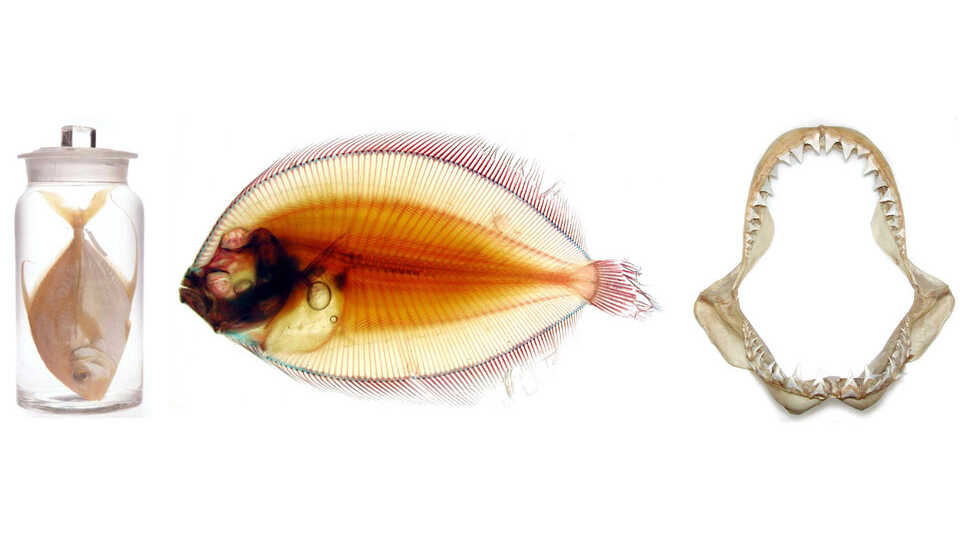
The Department of Ichthyology houses one of the largest and most important research collections of its kind in the world. There are nearly 200,000 cataloged lots (jars) containing roughly 1.8 million specimens, with many thousands of backlogged specimens still to be processed. There are representatives of over 11,000 nominal species of fishes in the collection, representing nearly a third of those known to science. The strengths of our holdings lie principally in marine fishes of the western and central Pacific, California, and freshwater fishes from South America and southeastern Asia. Our older historic collections from North America and the large number of type specimens are of particular importance to the ichthyological community.
Although the initial preservation is done in formaldehyde, the specimens are stored in alcohol. The bulk of the collection is in 75% ethanol (photo, above left), while our large vats are filled with 55% isopropanol. Cleared and stained specimens are stored in glycerine (photo, above center), while skeletal preparations are stored dry (photo, above right).
The collection can best be thought of as a library. Instead of books there are jars of fishes. As with any library, people come to browse and select what interests them. Just as libraries loan books, the collection loans specimens. We process an average of 170 loans per year, involving roughly 6000 specimens, which are shipped to ichthyologists the world over.
The library analogy is a good one, but it breaks down in one important area. Envision a usual library where the book titles change and you have the situation in a research collection such as this. Scientific names often change as we increase our knowledge of existing species and their relationships.
Loan Policy
Loans are generally made only for non-profit scientific research. Please state exactly what material you are interested in, preferably by catalog number, and the type of material you would like. We loan wet specimens, skeletal material, cleared & stained specimens, radiographs, etc. Also please state the project for which the material is intended, using either your institutional letterhead or e-mail address. No dissections, clearing and staining, or tissue sampling may be done without prior permission. Loans to students must be made to their advisors who must assume responsibility for the materials.
Requesting Data
Data are generally available only for non-profit scientific use. Please be as specific as possible, including what criteria to search for, what data fields you require (i.e. latitude, gear, vessel, length, etc.), and what format you'd like the data in (text delimited, Excel file, Access file, etc.)
Requesting Digital Images & Radiographs
Images are generally available only for non-profit scientific use. Please make your requests on either your institutional letterhead or e-mail address. Please be as specific as possible as to what you wish to see (i.e. full lateral, close-up dorsal, vertebral counts, fin ray counts, etc.) Requests will be done as time permits.
Terms of Use
These databases and all images within them are owned and copyrighted by the California Academy of Sciences, ©2014, or licensed to it. The data and images may be used freely by individuals and organizations for purposes of basic research, education and conservation. These data and images may not be used for commercial or for-profit purposes without the express written consent of the California Academy of Sciences, and may not be repackaged, resold, or redistributed in any form.
Use of the data or images in publications, dissertations and theses, or other scientific reports, should be accompanied by an acknowledgement of the Department of Ichthyology, California Academy of Sciences, as the source for the information. Please provide the Department with separates of articles resulting from the use of these data or images. This helps us to document the use of specimens as “vouchers” in the literature. It also helps us to justify continued funding for the collections so that these resources remain available into the future.
Share This
For inquiries, please contact:
David Catania
Senior Collections Manager
Department of Ichthyology
California Academy of Sciences
55 Music Concourse Drive
San Francisco, CA 94118
415-379-5279
dcatania@calacademy.org
The Department of Ichthyology is home to one of the largest and most important collections of fishes in the world, and is designated as one of eight International Centers for Ichthyology in North America. Meet the researchers, explore projects and expeditions, and more.
Learn more about the Ichthyology department.